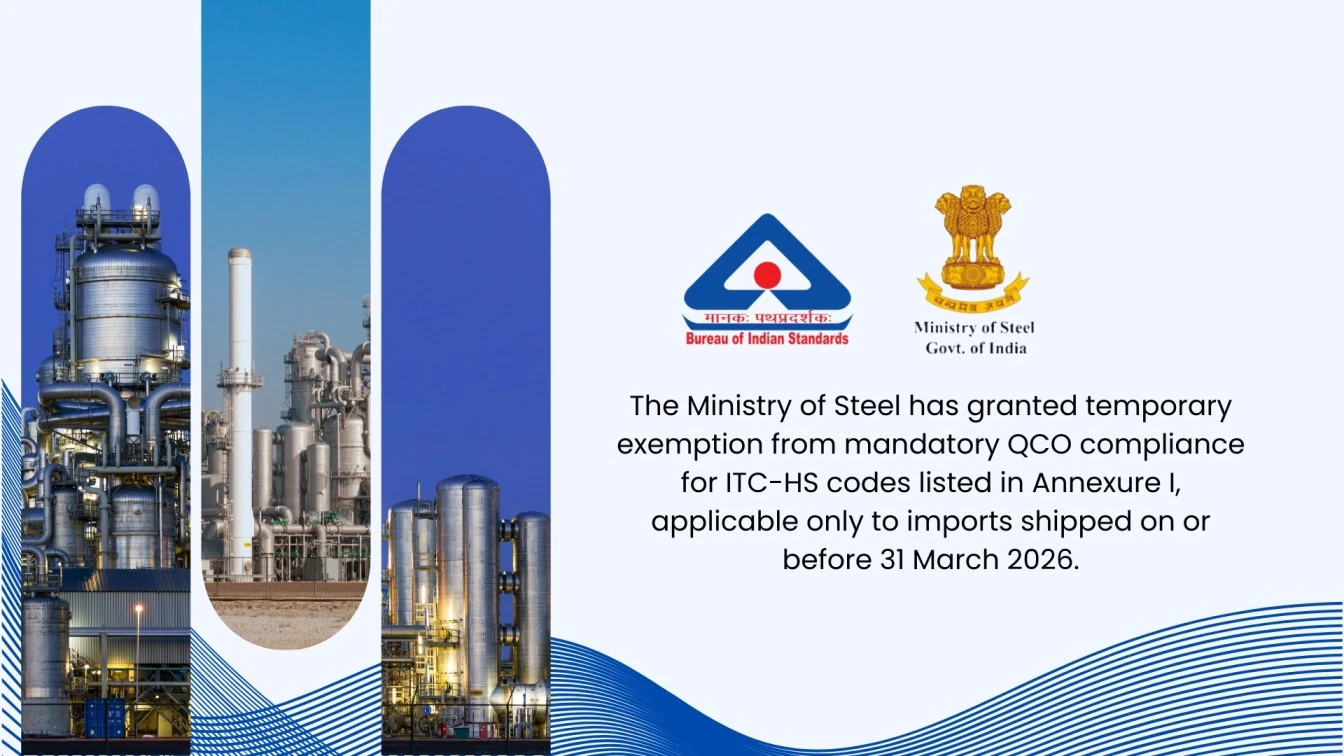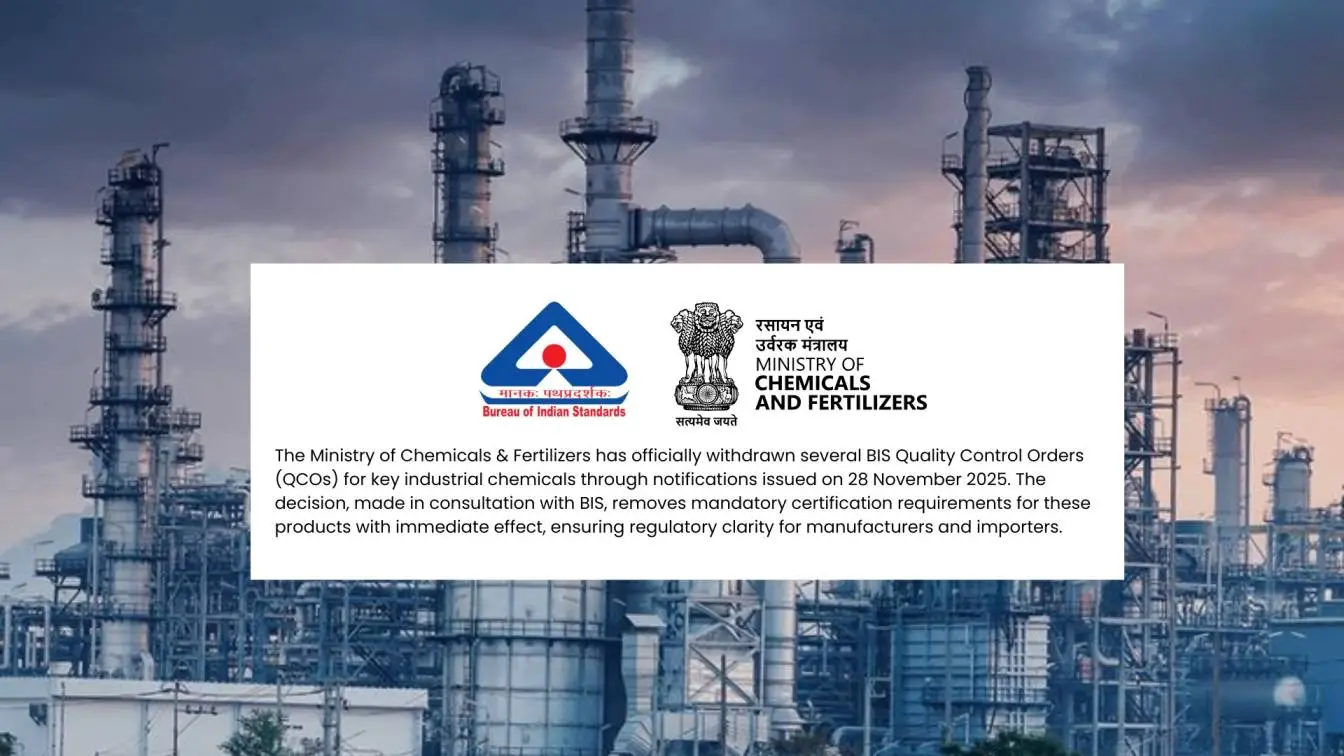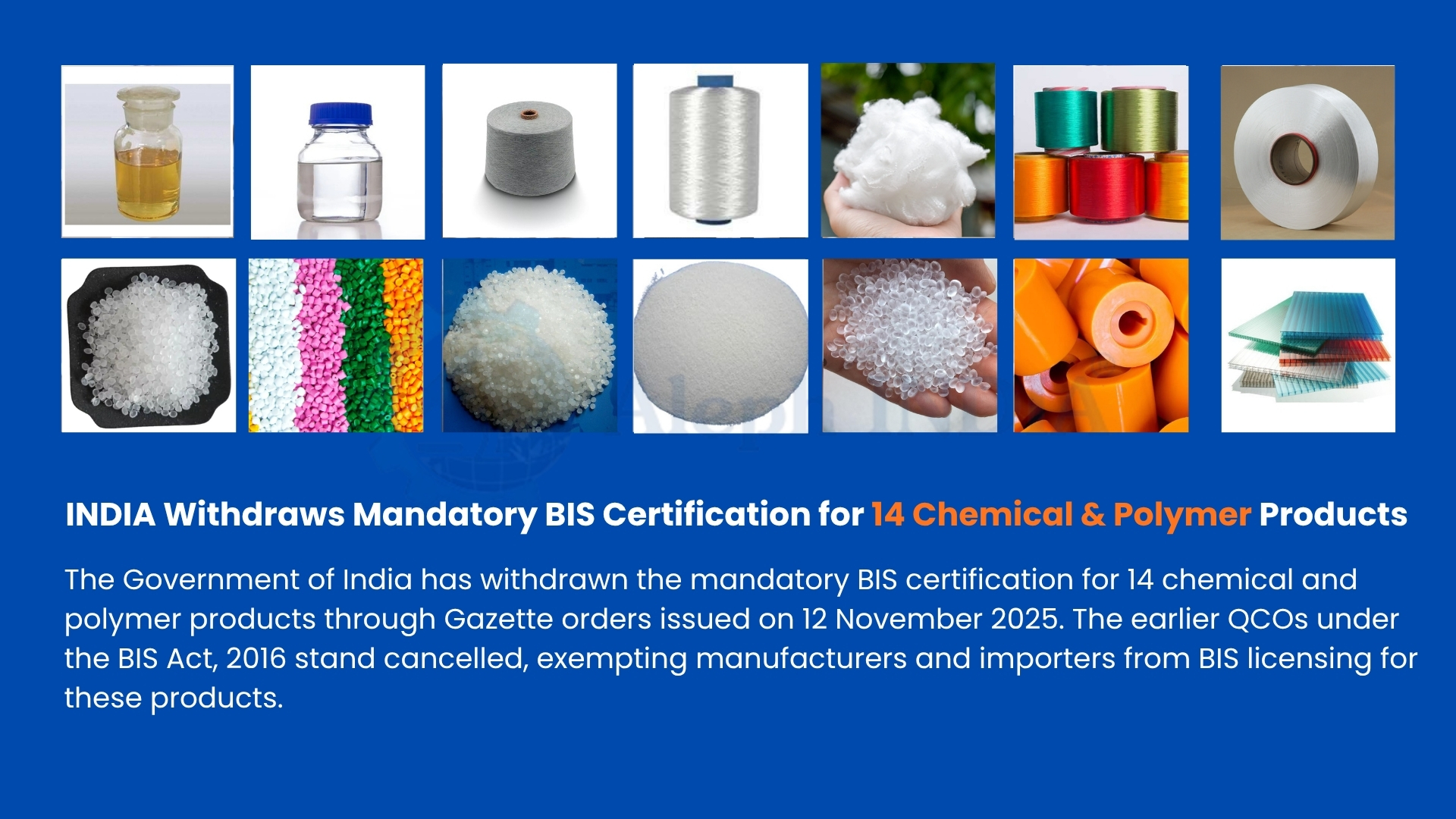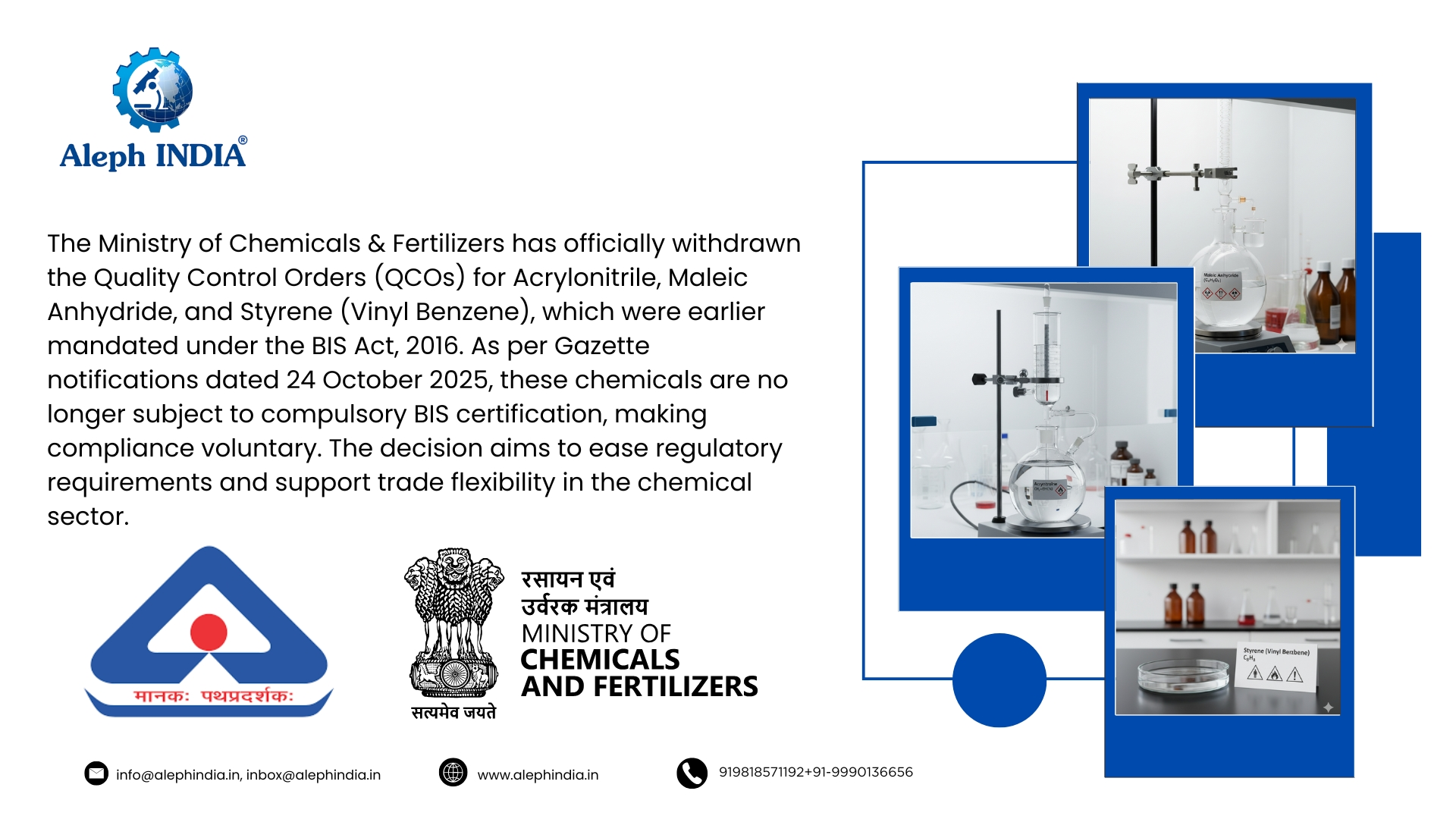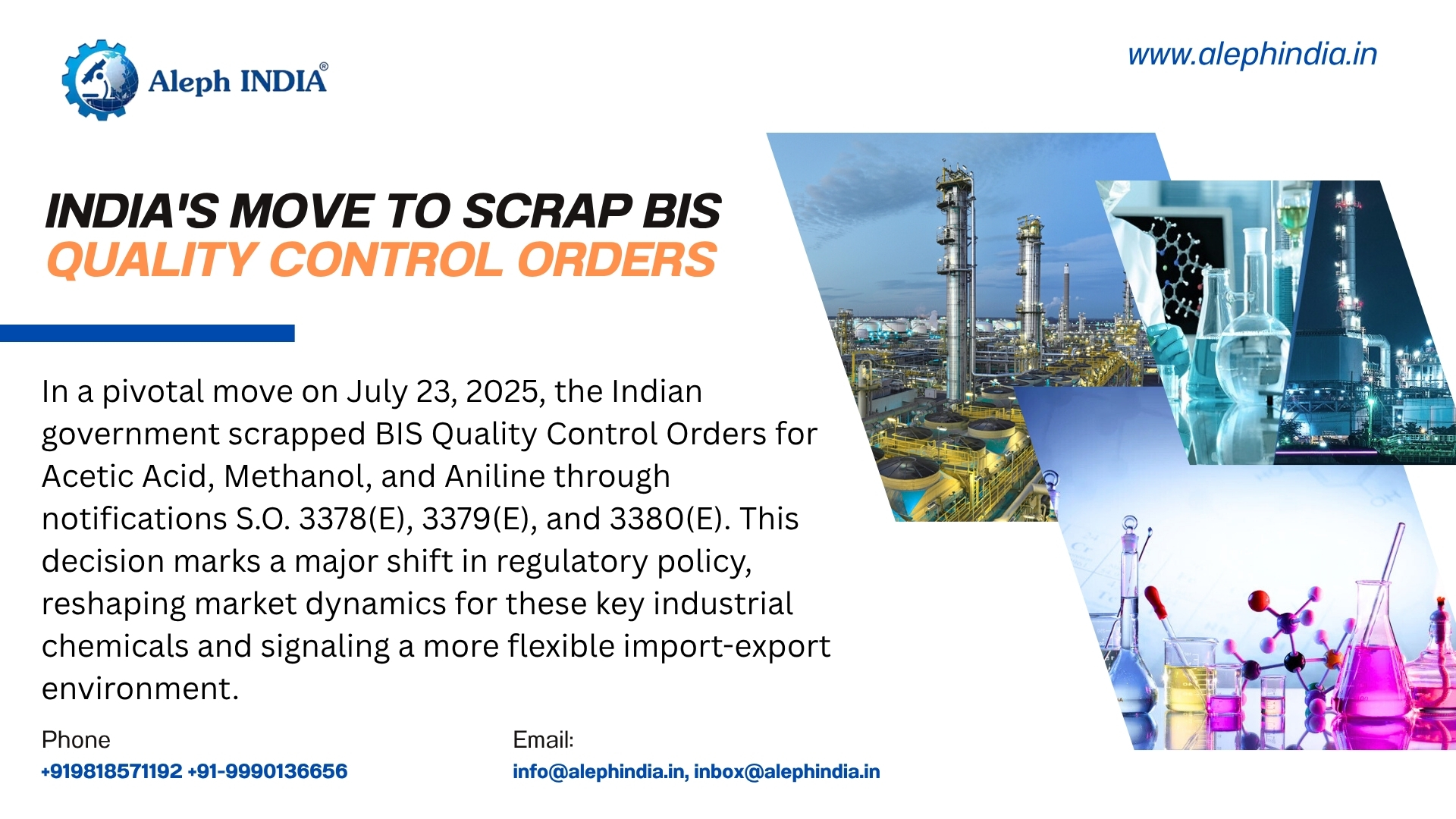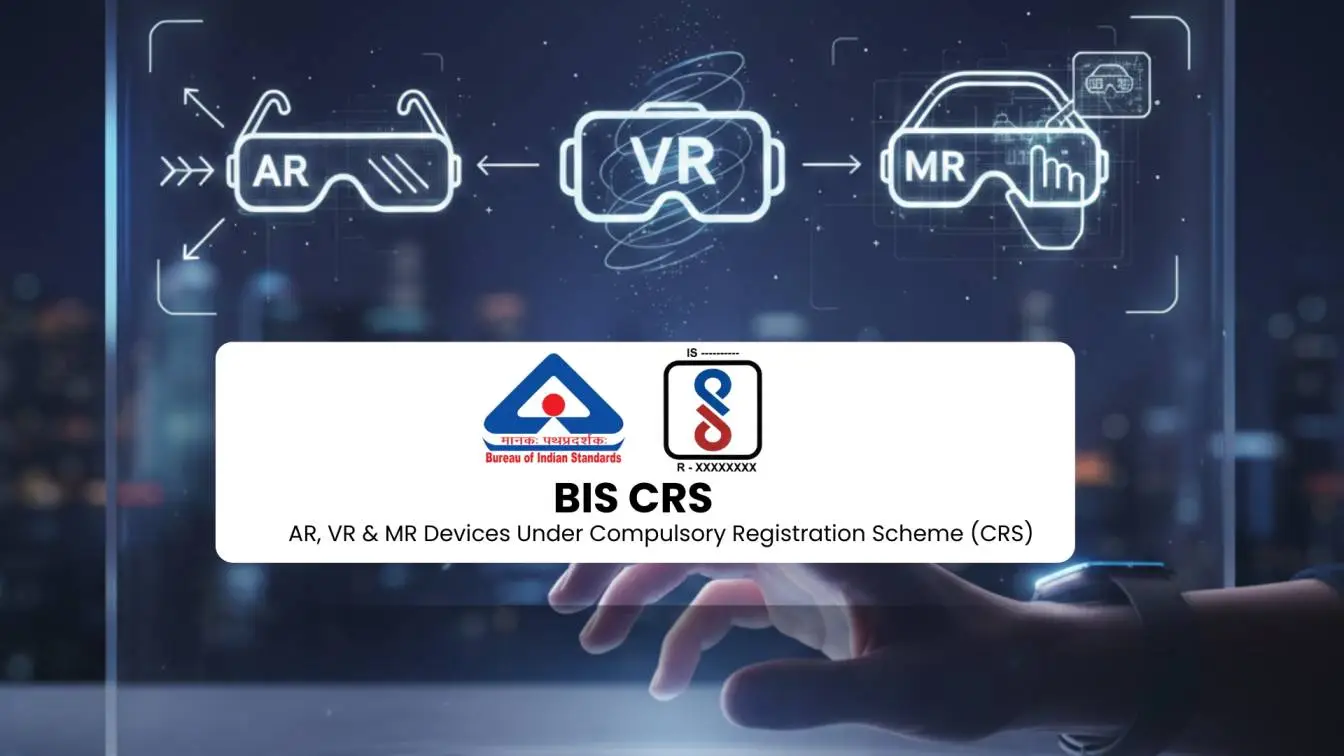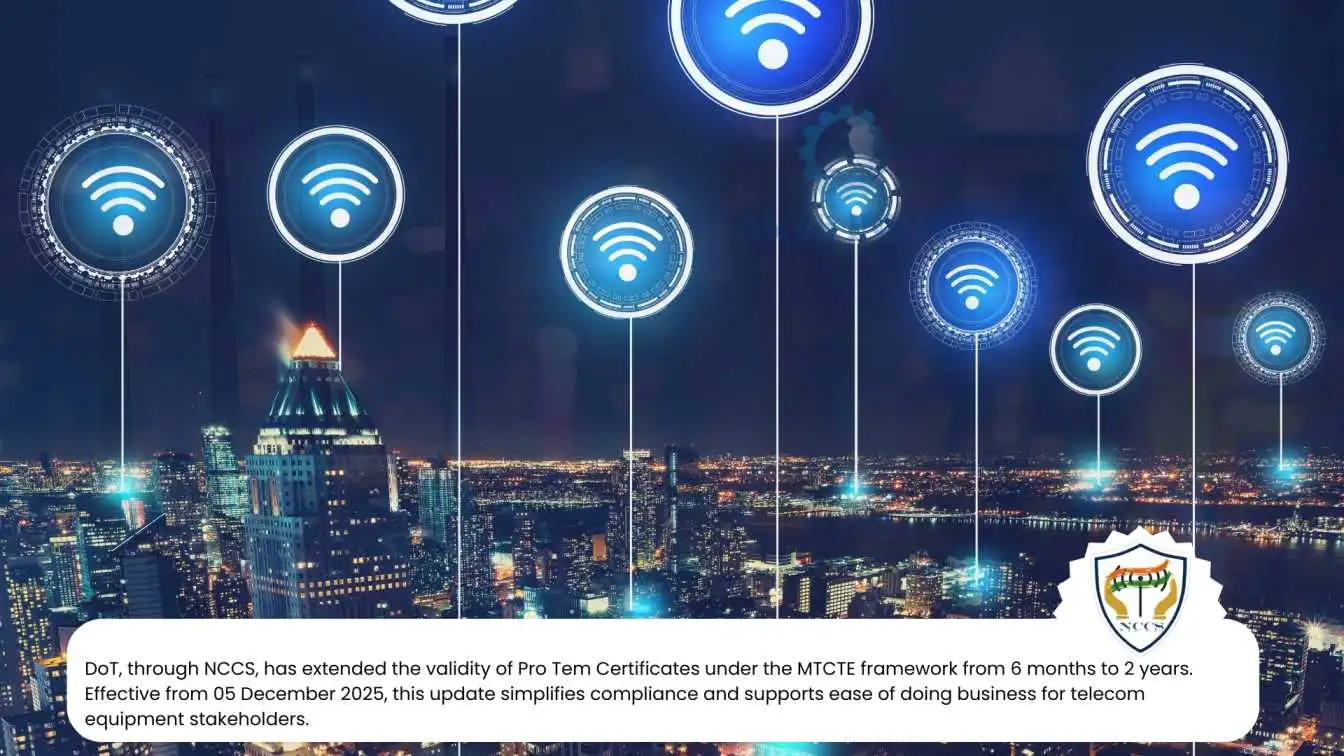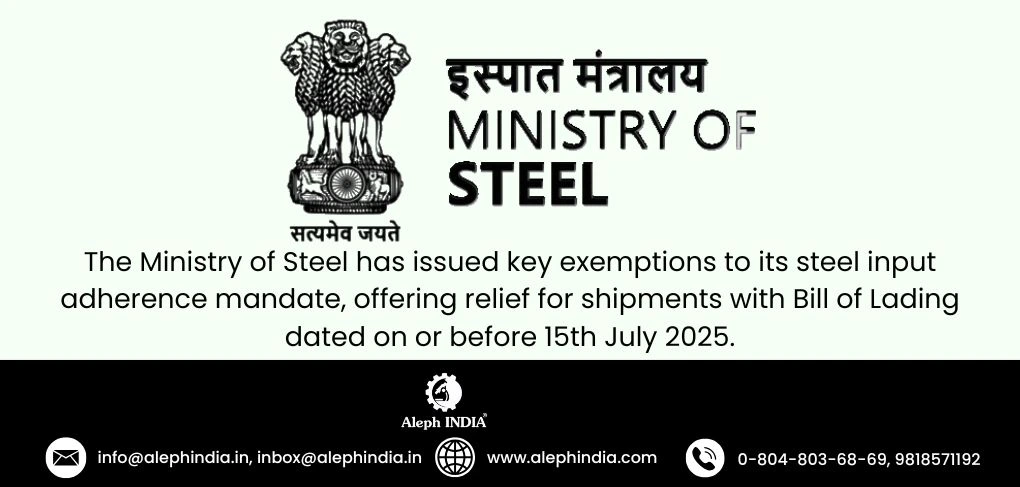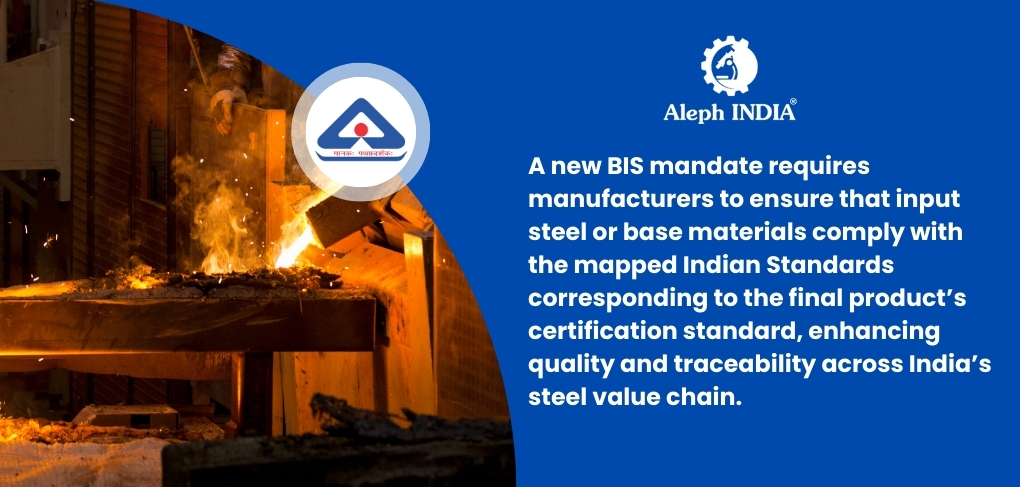- HOME
- ABOUT US
- SERVICES
-
LICENCE & CERTIFICATION
- BIS (ISI MARK) FOR FOREIGN MANUFACTURERS
- DOMESTIC PRODUCT CERTIFICATION (ISI MARK)
- BIS SCHEME X CERTIFICATION
- BIS CERTIFICATE OF CONFORMITY (CoC)
- BIS HALLMARKING
- REACH CERTIFICATION (GLOBAL)
- LABORATORY RECOGNITION SCHEME (LRS)
- WORLD MANUFACTURER IDENTIFIER (WMI) CODE
- ECO MARK
- TAC APPROVAL FOR AUTOMOBILE
- PESO CERTIFICATION
- SASO CERTIFICATION
- CDSCO CERTIFICATION
-
REGISTRATION
- BIS (CRS) REGISTRATION FOR ELECTRONIC PRODUCT
- WPC-ETA APPROVAL
- BEE CERTIFICATION
- E-WASTE MANAGEMENT (EPR)
- EPR REGISTRATION FOR PLASTIC WASTE MANAGEMENT
- EPR REGISTRATION FOR BATTERY WASTE MANAGEMENT
- EPR REGISTRATION FOR USED OIL
- LEGAL METROLOGY (LMPC)
- TEC/MTCTE APPROVAL
- CE CERTIFICATION
- UL CERTIFICATION
- ROHS LICENCE
- DRONE REGISTRATION
- MOEF LICENCE
-
AUXILIARY
- STANDARDIZATION (SCIENTIFIC) DIVISION
- TRAINING SERVICES (NATIONAL & INTERNATIONAL)
- IMPORT/EXPORT LICENCE
- FSSAI CERTIFICATION
- MSME/SSI/NSIC REGISTRATION
- ISO REGISTRATION
- BRAND REPRESENTATION
- LABORATORY EQUIPMENT AND SETUP
- TRADEMARK REGISTRATION
- MAKE IN INDIA SUPPORT
- AG-MARK LICENCE
- THIRD PARTY INSPECTION AND MONITORING SERVICES
-
- PORTFOLIO
- UPDATES
- CONTACT
- LOGIN
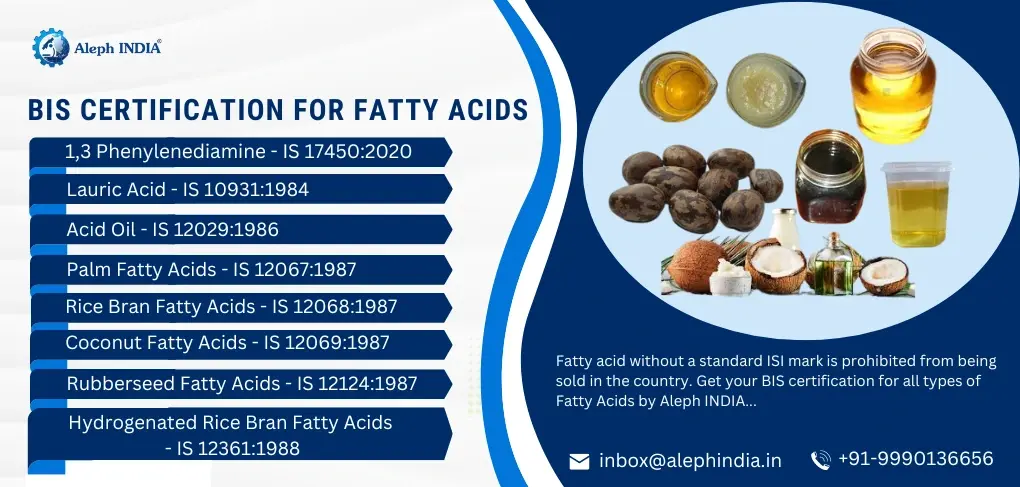
BIS Certification for Fatty Acids
Economic growth and development depend on the quality and quantity of products and services produced in the country. The Indian government is also working towards achieving the $5 trillion economy. In this competitive market, it isn't easy to survive without a standard quality and certified Product. Many substandard and falsified products are frequently manufactured in the country and contain unknown impurities. In the public interest, the government has taken a step forward by making BIS certification mandatory for fatty acid producers. All manufacturers must obtain BIS certification for fatty acids to ensure the user's health and safety.
As you are aware, importers and manufacturers may be required to obtain a BIS licence in order to sell products in the Indian market. Let's have a look at QCO 2022 for fatty acid.
Fatty Acid Quality Control Order 2022
As per the Quality Control Order, 2022, of the Department of Chemicals and Petrochemicals, the Bureau of Indian Standards has made it mandatory to obtain BIS certification for all types of Fatty Acids. Fatty Acids shall conform to the corresponding Indian Standard and bear the Standard Mark (ISI Mark) under a license from the Bureau of Indian Standards as per Scheme-I of Schedule-II of the Bureau of Indian Standards (Conformity Assessment) Regulations 2018.
Fatty acid without a standard ISI mark is prohibited from being sold in the country. Failure to do so will result in criminal liability, including imprisonment and massive fines. This order was issued by the Department of Chemicals and Petrochemicals, Ministry of Chemicals and Fertilizers, which cover all types of fatty Acid in the mandatory certification list of BIS. BIS certification is compulsory for 1, 3 Phenylenediamine, Lauric Acid, Acid Oil, Palm Fatty Acids, Rice Bran Fatty Acids, Coconut Fatty Acids, Rubberseed Fatty Acids, Hydrogenated Rice Bran Fatty Acids.
Before moving forward, Let’s take a closer look at BIS and BIS certification.
What is BIS?
BIS (Bureau of Indian standard) is an Indian standard organization responsible for the standard formulation, marking, and quality certification of goods. BIS operates several certification programs to ensure the public receives high-quality, risk-free products.
BIS License:
BIS runs a product certification scheme, also known as the ISI Mark certification scheme, to grant manufacturers a BIS licence to use the standard ISI mark on products and sell them into the Indian market. Products with the ISI Mark provide assurance that they adhere to all applicable Indian standards.
Manufacturers must obtain a BIS licence for their products from BIS to use the standard mark and sell their products in the Indian market. Only after verifying that the Product complies with all applicable Indian standards, BIS Certificate is granted. The manufacturer must ensure that Fatty Acids conform to applicable Indian standards to get a BIS certificate for Fatty Acids.
Benefits of obtaining BIS Certification for Fatty Acids:
Manufacturers can gain the following benefits by getting a BIS certificate for fatty acids:
- Gain consumer trust
- Ensure consumer health and
- Assure that their Product is safe and out of physical harm.
All fatty acids, including 1, 3 Phenylenediamine, Lauric Acid, Acid Oil, Palm Fatty Acids, Rice Bran Fatty Acids, Coconut Fatty Acids, Rubber seed Fatty Acids, Hydrogenated Rice Bran Fatty Acids are covered under the mandatory certification list of BIS. The top exporters of industrial fatty acids, Palm fatty acids, oils, and alcohols are Germany, Indonesia, Malesia, South Korea, Netherlands, the United States, China and Japan. Any foreign manufacturer who wants to export or sell fatty Acid in India must first obtain a BIS certificate for import in India through an Authorized Indian Representative.
You can learn more about BIS certification for the following products:
| S.No. | IS Number | Product Name |
|---|---|---|
| 1 | IS 12068:1987 | BIS Certification for Rice Bran Fatty Acids |
| 2 | IS 12069:1987 | BIS Certification for Coconut Fatty Acids |
| 3 | IS 12124:1987 | BIS Certification for Rubber seed Fatty Acids |
| 4 | IS 12361:1988 | BIS Certification for Hydrogenated Rice Bran Fatty Acids |
| 5 | IS 17450:2020 | BIS Certification for 1, 3 Phenylenediamine |
| 6 | IS 10931:1984 | BIS Certification for Lauric Acid |
| 7 | IS 10931:1984 | BIS Certification for Acid Oil |
| 8 | IS 12067:1987 | BIS Certification for Palm Fatty Acids |
Check the list of the products that require mandatory BIS Certification for manufacturing and selling in the Indian market. List of Products Under Mandatory BIS Certification. In the above paragraph, you learned about what is a BIS licence. Now, you might be wondering how to get BIS certification for your Product. Let's go over the process of obtaining BIS certifications.
Process of BIS Certification for fatty acid:
| Step 1 | Documentation before submission of application |
| Step 2 | Submission of application with requisite documents to BIS |
| Step 3 | Scrutiny of application by BIS officials |
| Step 4 | Nomination of auditor for Audit by BIS |
| Step 5 | Audit of manufacturing premises by BIS auditor |
| Step 6 | Sample draw for independent testing |
| Step 7 | Sample testing in BIS approved laboratory |
| Step 8 | Grant of BIS license to manufacturer |
DOCUMENT REQUIRED FOR BIS CERTIFICATION FOR FATTY ACIDS:
Documents required for BIS Certification are specific and generic, which include:
- Factory Registration Documents & information
- Identity proof
- Manufacturing process flow chart
- Details of Authorized Signatory and other related documents.
- Adequate testing facilities
- Quality Control Parameters and their records
- Laboratory testing report and other information as per BIS norm
COST OF BIS LICENSE FOR FATTY ACIDS
BIS certification costs include:
- Application fee
- Audit fee
- Sample testing fee
- License fee
- Marking fee
Get in touch with us for more details about BIS certification cost and process for Fatty Acids.
Validity and Renewal of BIS Licence
BIS license is initially granted for not less than one year and up to two years. A renewal application and license fee must be submitted within 90 days of the license's expiration date. If the licensee does not submit a renewal application and pay the required fee within 90 days of the license's expiration date, the licence will expire.
Conclusion:
At last, it is mandatory for importers and manufacturers to obtain a BIS certificate/licence to use the standard ISI mark for fatty acids. Any fatty Acid without the ISI mark is not permitted to be sold in the country.
However, Compliance can be challenging. Obtaining BIS certification requires cooperation with authorities, sample collection for testing, and meeting BIS requirements, so it is not as simple as it first appears. Therefore, it is best to seek professional assistance so that they can manage the entire procedure and assist you in obtaining a BIS certificate.
Aleph INDIA has been serving the industry as a one-stop solution for all product regulatory compliance. With our extensive knowledge and experience, we can assist importers and manufacturers in meeting all requirements and getting a BIS licence so that they can easily import or sell their products in the Indian market and increase their profits.


